Hi ! We hope this site helps you! ٩(ˊᗜˋ*)و As an Amazon Associate, we earn from qualifying purchases without additional cost. Click to read more about our Privacy Policy or Affiliate Disclosure
“Is Japanese hard?” is what most people asked about before they start learning the language. In the article below, you will find the answer and also tips to have a smoother sail on your journey to learn Japanese, especially for beginners who just want to start their journey.
So, what’s the answer? Is Japanese hard? Should I learn it?
Anyone who says that learning a totally new language which have a very (very very!!) different structure than the one you have is easy, would be like telling a little kid that black coffee is tasty.
Will the kid say it’s tasty? I’m pretty sure he’ll throw it up in the first sip! But is black coffee isn’t tasty? Nope, it’s just that the kids hasn’t got used to the taste yet.

So I won’t sugar coat it. Learning Japanese will not be easy , especially at the beginning. In fact, ANYTHING IS HARD before you get used to it. Walking is hard for a baby, and spelling is hard for little kid who just learn to read.
So “Is Japanese hard or not?” IS NOT the question you should ask. A more important questions is “Why do you want to learn Japanese? What is your goal?”. And “How to learn Japanese effectively?”
Why do you want to learn Japanese?
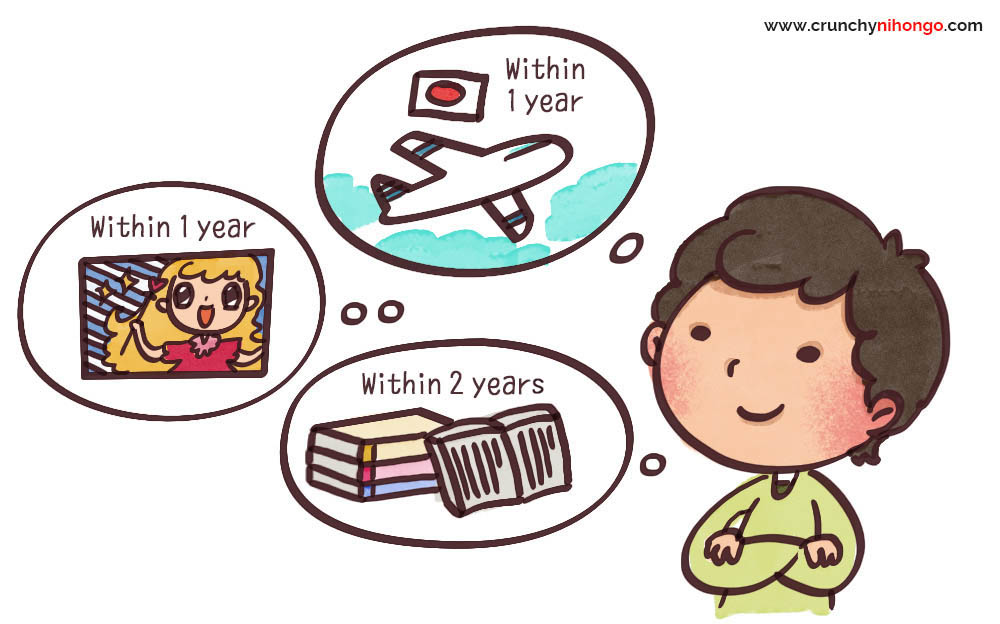
You need to know your exact purpose and create mini goals with deadlines. It will give you motivation to get through the learning process…
Anything will do, here’s some example for purpose:
• You want to get a good mark on next Japanese test
• You want to get a job / attend school or university / live in Japan within 3 years from now
• You want to be able to understand and read Japanese games/books/movies within 2 years from now
• You want to be able to travel easily in Japan within 3 years from now
Next step is to write down your mini-goals to achieve your purpose… Here are some examples:
• Master hiragana in 2 weeks
• Learn about particle は, が, を this week
• Finish JLPT N5 reference book in 2 months
How should I start learning Japanese?
I don’t know where to start!
First of all: Master Hiragana!(Japanese alphabet)
Before you start any learning, you need to master Japanese basic alphabet, HIRAGANA. There are another sets of writing, but this is the one you need the most. It might look overwhelming but with mnemonics method you can master it as fast as a few days! So what are you waiting for? Start learning now ヾ(@°▽°@)ノ
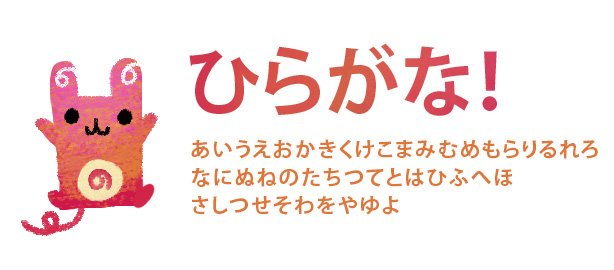
Crunchynihongo have ultimate guide to help you master hiragana easily. Be sure to check it out, and then try to practice reading hiragana everyday to maintain it in your brain.
Then: Get access to JLPT lessons material
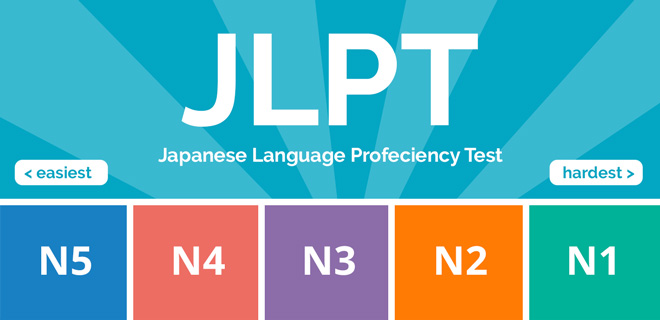
Despite any purpose you have, I really recommend you to follow JLPT (Japanese Language Proficiency Test) material.
There are 5 JLPT levels. Starting from N5 (the easiest) and N1 (the hardest).
• Mastering N5 material will help you to travel in Japan much easier and able to understand basic Japanese.
• After mastering N5 – N3 material, you will be able to start learning by reading manga / anime / playing games with furigana. (Furigana is kanji spellings written in hiragana, so you will be able to check out dictionary to know the meaning of a kanji)
• To get a proper job in Japan, you will need to master N2 – N1 material
How to access JLPT lessons materials ?
The best way to learn JLPT material is undoubtly from books.But Note that if you decided to buy a book, pick a book which doesn’t teach with romaji. Here are the best hand-pick recommendations for Japanese textbook references for beginners. Use the TRY N5 as the main book, and use the exercise book and grammar dictionary as a supplement. Keep in mind that you need to master hiragana first before starting to use the book
For words you don’t understand, you can get a dedicated Electronic Dictionary such as this (Model K) XD-K9800 denshi jisho here if you’re very serious with learning Japanese (Check out this article to learn more about Japanese Electronic Dictionary). Or if its improbable, you can download a
Free offline Japanese dictionary : Takoboto for Android | Imiwa for IOS
Recommended reference book to learn Japanese
Buying a correct textbook will help you immensely with your Japanese learning. Below you can find a must-have list for a beginner learner.
• TRY! Japanese JLPT N5 grammar with CD (For JLPT N5 lessons)
• TRY! Japanese JLPT N4 grammar with CD (For JLPT N4 lessons)
• A Dictionary of Basic Japanese Grammar (For thorough grammar explanations)
• Shin Nihongo 500 Mon JLPT N5 – N4 (For exercise)
IMPORTANT TIPS TO KNOW ABOUT JAPANESE LANGUAGE
1. You don’t need to be able to write kanji!
Yes, it’s not a lie. In fact, JLPT test doesn’t require any writing at all and you can easily type kanji with computer/phone. So YOU DON’T HAVE TO LEARN HOW TO WRITE KANJI! You just need to be able to recognize kanjis. The most important thing in Japanese is language comprehension. But if writing kanji is the best way for you to learn/memorise it, it’s okay though.
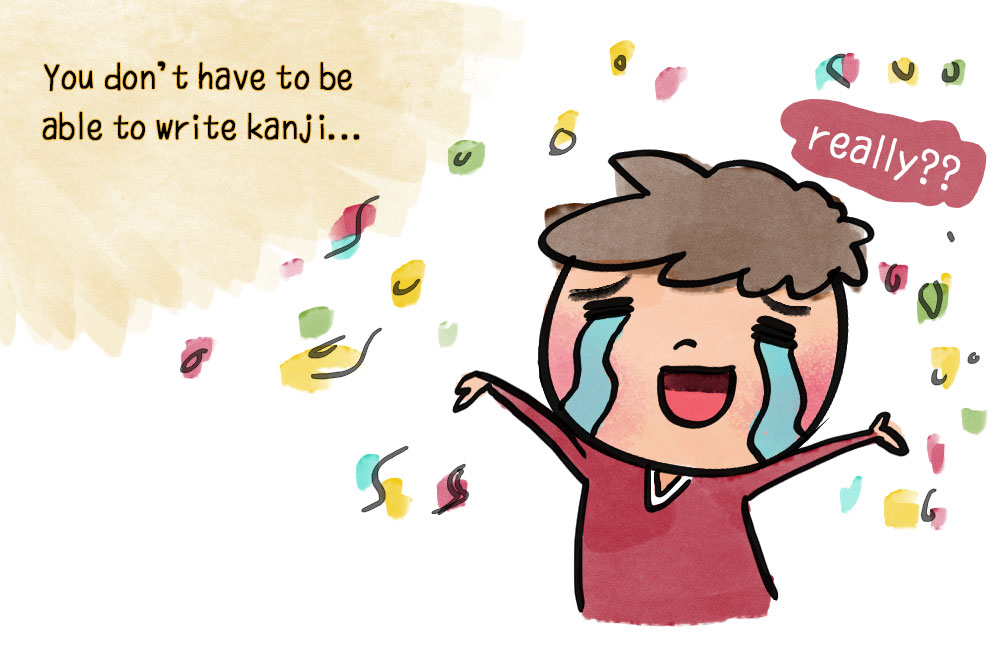
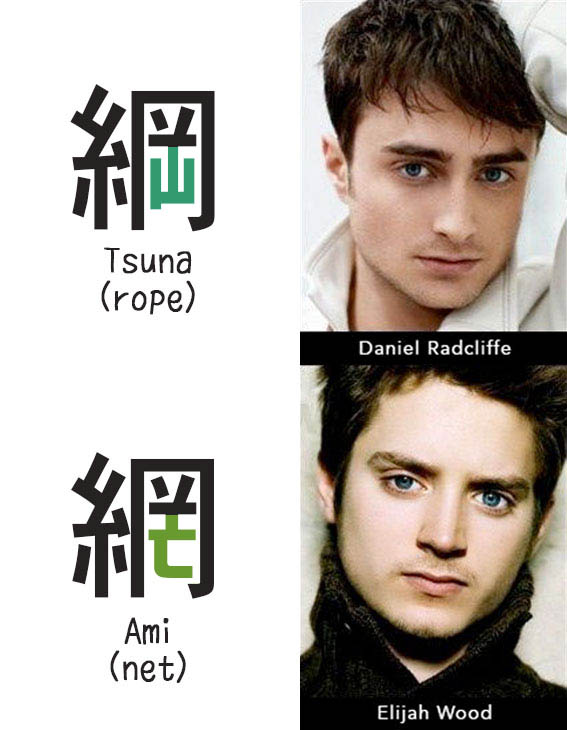
To easily learn kanji, use mnemonics & try to read it in a sentence instead as a single kanji / vocabulary. And be sure to read it as often as you can. You will easily remember people you often see right?
Check out [CrunchyNihongo’s Tumblr] for vocabularies and kanji mnemonic cards, and use Tangorin to get sentence examples.
2. Google Translator or any auto-translations won’t work.
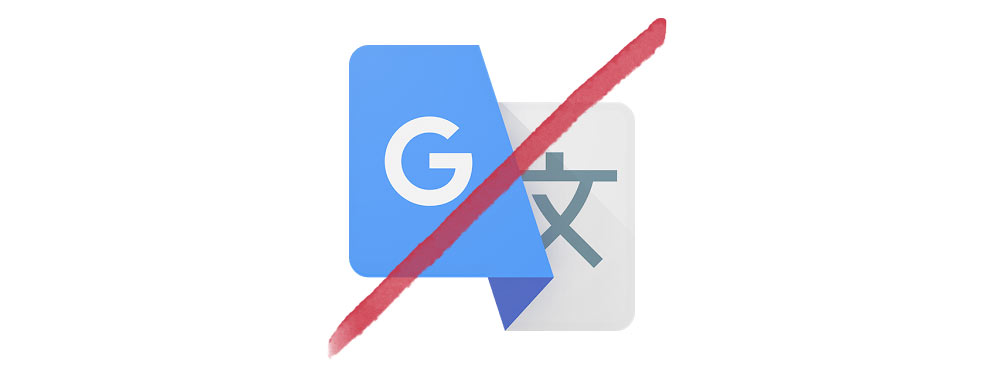
This is one of important factor that you need to understand while learning Japanese.
3. Japanese basic grammar FIRST!
Japanese words will be heavily conjugated, and it will modify the meaning as well. So without good understanding of verb conjugation and grammar, you cannot understand most of Japanese sentence even though you have memorise a lot of vocabularies.
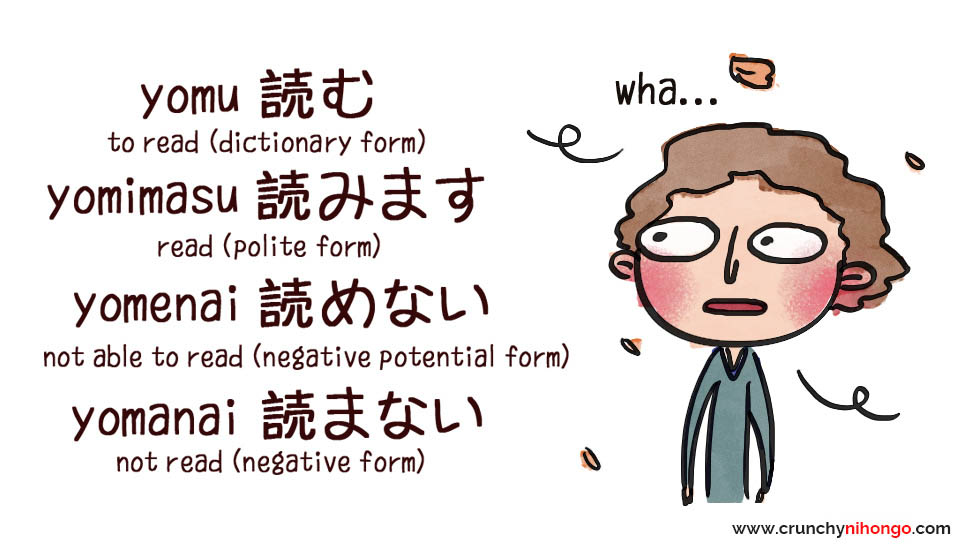
And Japanese sentence main foundation is particles. The first you need to understand is about particle は and を. You need to put a correct particle on each part of sentence to create a fully understandable Japanese sentence.
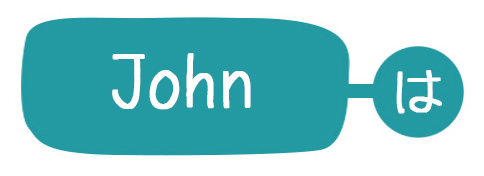
For example, this particle is read as WA, and it marks a TOPIC. So this means that you make [John] as TOPIC of a sentence.

This particle is read as O. [A] を [action] means that an [Action] is applied to [A].
So this means that action [eat] is applied to [Fish].
To make a complete sentence,we simply add them together.

It will means “John eats fish”. Note that this is not the literal translations. It’s a rephrase of the Japanese sentence, using natural English.
Japanese sentence is unique. As long that you used a correct particle to mark a part of sentence, the placement is quite flexible. So this arrangement below is also grammatically correct.

4. Parsing Japanese sentence.. What is it?
In Japanese, you will need to analyse a sentence a lot at the beginning, before your brain get used to the pattern. Japanese sentence is written like this:
Yes, no space. But I bet you can still read the text above since your brain already familiar with the vocabularies and English patterns.
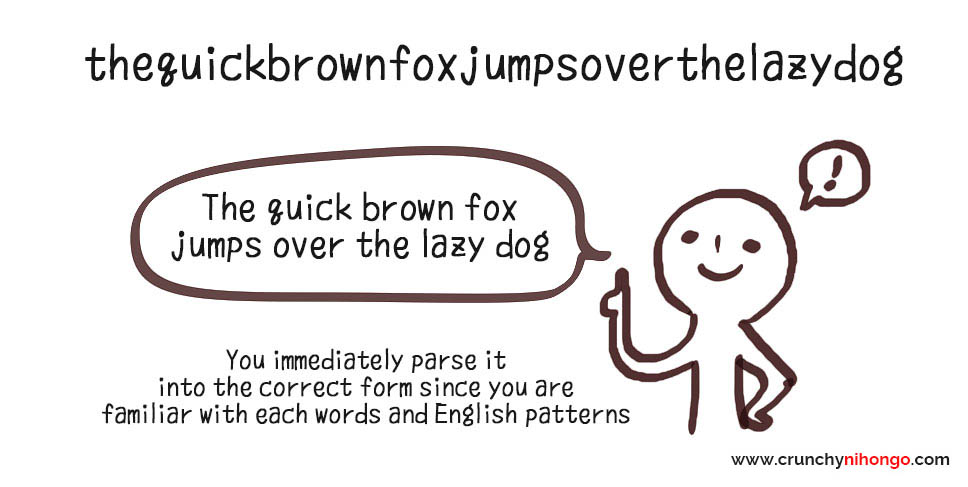
But imagine if you don’t have enough vocabulary and English patterns knowledge… You might parse it very wrong and the sentence won’t make sense at all…
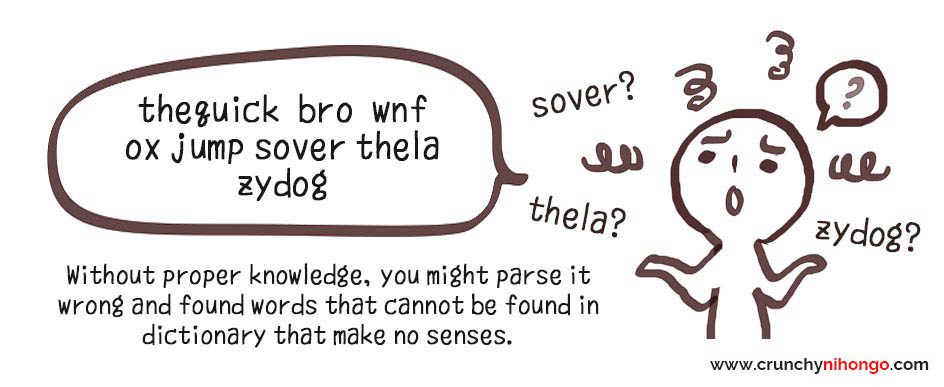
That’s what happened when you first learning Japanese. you will need to analyse which part is a word, which part is a grammar, what conjugation the verb use, and so on… Don’t worry though, by the time that your brain get used to it, reading Japanese will be as natural as reading English with no space!
5. Can I learn Japanese from mangas/animes/drama/games?
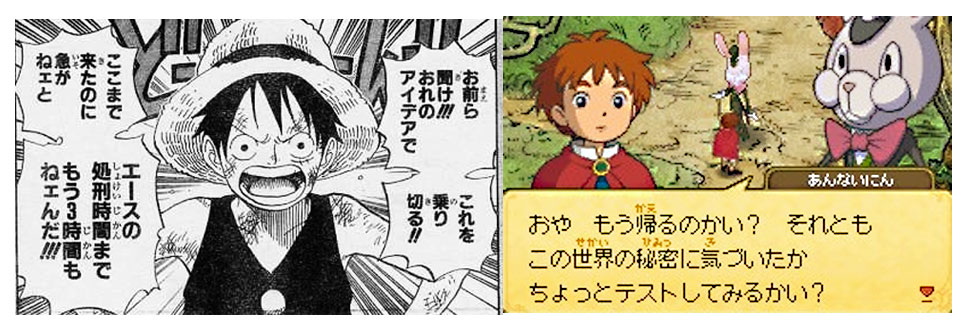
Learning Japanese from favorite mangas/ animes / or J-drama will be very very tempting. The answer to this question is No and Yes.
No if you are very very beginner learners. Why? Since Japanese have a very very different structure than English, and you cannot even use dictionary to help you understand what you read/heard. So it will only make you super confuse. So no, I don’t recommend you to learn from mangas/animes/games. Though anime/drama will be very useful to help you get used to Japanese intonation and how they pronounce sentences.
And yes if you have finish learning JLPT N3 material. Since you will have enough foundation to be able to learn from what you read/heard. In fact, it will be very recommended to expand your vocabulary and get used to the language.
We hope this article help you to get start for your journey to learn Japanese easier!。゚✶ฺ.ヽ(*´∀`*)ノ.✶゚ฺ。
